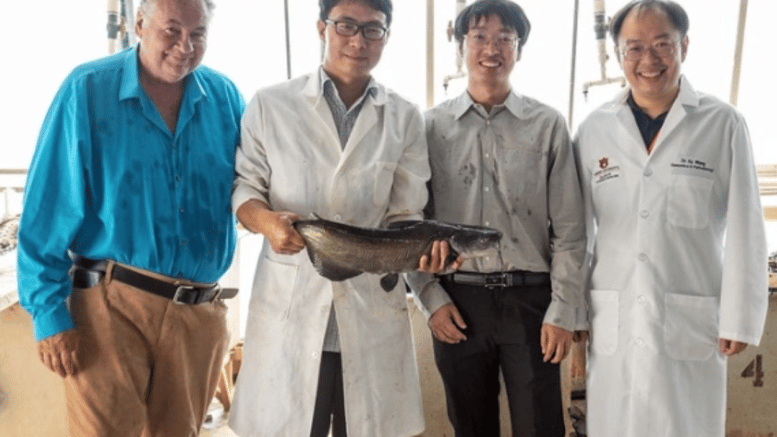Millions of fish are farmed in the US every year, but many of them die from infections. In theory, genetically engineering fish with genes that protect them from disease could reduce waste and help limit the environmental impact of fish farming. A team of scientists have attempted to do just that—by inserting an alligator gene into the genomes of catfish.
Americans go through a lot of catfish. In 2021, catfish farms in the US produced 307 million pounds (139 million kilogram) of the fish. “On a per-pound basis, anywhere from 60 to 70% of US aquaculture is … catfish production,” says Rex Dunham, who works on the genetic improvement of catfish at Auburn University in Alabama.
But catfish farming is also a great breeding ground for infections. From the time farmed fish are newly hatched to the time they are harvested, around 40% of the animals worldwide die from various diseases, says Dunham.
Could the new genetic modification help?
The alligator gene, which Dunham’s research turned up as a potential answer, codes for a protein called cathelicidin. The protein is antimicrobial, says Dunham—it’s thought to help protect alligators from developing infections in the wounds they sustain during their aggressive fights with each other. Dunham wondered whether animals that have the gene artificially inserted into their genomes might be more resistant to diseases.
Dunham and his colleagues also wanted to go a step further and ensure that the resulting transgenic fish couldn’t reproduce. That’s because genetically modified animals have the potential to wreak havoc in the wild should they escape from farms, outcompeting their wild counterparts for food and habitat.
Transgenic survivors
Dunham, Baofeng Su (also at Auburn University), and their colleagues used the gene-editing tool CRISPR to insert the alligator gene for cathelicidin into the part of the genome that codes for an important reproductive hormone, “to try to kill two birds with one stone,” says Dunham. Without the hormone, fish are unable to spawn.
The resulting fish do seem to be more resistant to infections. When the researchers put two different types of disease-causing bacteria in water tanks, they found that gene-edited fish were much more likely to survive than their counterparts that had not undergone gene editing. Depending on the infection, “the survival rate of the cathelicidin transgenic fish was between two- and five-fold higher,” says Dunham.
The transgenic fish are also sterile and can’t reproduce unless they are injected with reproductive hormones, say the researchers, who published their findings online at the preprint server bioRxiv. The paper has not yet been peer-reviewed.
“When I first [heard about the study], I thought: what on earth? Who would have thought to do this? And why would they?” says Greg Lutz at Louisiana State University, who has been researching the role of genetics in aquaculture for decades. But Lutz thinks the work has promise—disease resistance can have a big impact on the amount of waste generated by fish farms, and reducing this waste has long been a goal of gene editing in farmed animals, he says.








